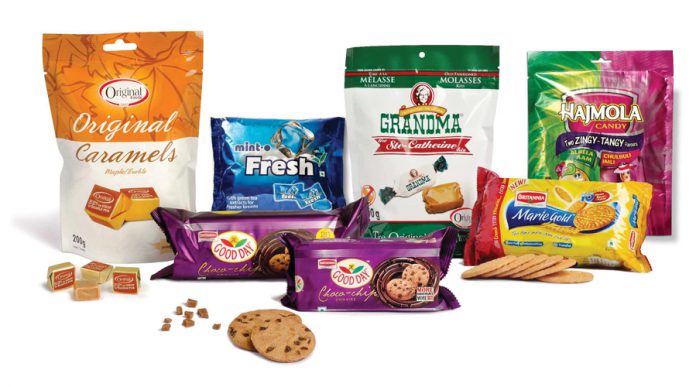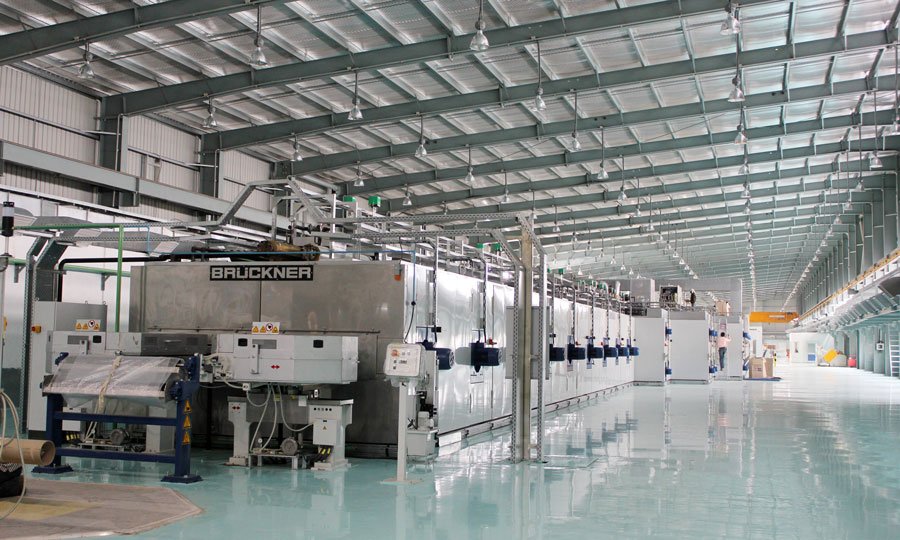Expansion in packaging film capacities by Indian and South Asian manufacturers

Alongside the rapid growth of the flexible packaging printing and converting industry in India and S Asia, a great deal of investment is as well beingness made to increase packaging film manufacturing capacities. Whereas the summit dozen or so manufacturers of polyester, BOPP, BOPET packaging films have a electric current capacity of approximately 1.5 million tonnes at least half dozen of these companies are expected to add new lines for either polyester or BOPP films in the next two years. Another feature of capacity enhancement is the improver of new metallizing and coating lines for the manufacturer of value added and speciality packaging films.
Other packaging film manufacturers are also evaluating the demand for specific materials and in specific regions both in the country and regionally, since several Indian packaging motion-picture show manufacturers now accept lines installed overseas. We recount some of the expansion plans of the leading Indian manufacturers of packaging films below.
Jindal Poly Films to add 161,000 tonnes BOPP capacity
The largest Indian manufacturer of packaging films Jindal Poly Films is investing Rs. 1,000 crore (approximately US$ 150 million) for its capacity expansion both within the state and overseas. According to the company'southward press release in November 2015, "The visitor has fatigued upwards time to come expansion plans for its India performance and for its subsidiaries in USA and Europe totalling to Rs 1,000 crores." We believe that roughly half of the new capacity will be installed in Bharat while the residue will become to Jindal Poly's overseas plants.
At Nashik in Maharashtra, Jindal Poly Films operates the globe's single largest plant for production of BOPET and BOPP films with boosted plants in the US and Europe some of which are part of its acquisition of the global BOPP films business of ExxonMobil Chemic in 2013. Jindal Poly Films' current BOPP capacity is 445,000 tonnes annually while its annual BOPET capacity is 127,000 tonnes for a combined film capacity of 572,000 tonnes.
Jindal Poly Films volition increase its almanac BOPP capacity by 161,000 tonnes to reach an annual global capacity of 606,000 tonnes while its overall capacity including BOPET will rise to 733,000 tonnes. The capacity expansion comprises four BOPP production lines, metallizers, coating lines along with the required ancillary equipment. The new capacities are expected to be operational over the next two years, with 2 of the lines to be installed in India.
Cosmo Films to add 60,000 tonne BOPP line in Karjan
As we wrote in our November 2015 issue, Cosmo Films has announced its plans to install a new 10.4-metre wide BOPP line in Karjan near Vadodara in Gujarat in early 2022 with an investment of approximately Rs. 200 crore. In addition a cast polypropylene line is being added to Cosmo's Maharashtra establish at a price of Rs. xx crore. The new BOPP 60,000 metric tonne expansion at Karjan will increase the company'due south annual BOPP production capacity from 136,000 to 196,000 metric tonnes.

Cosmo and Brückner are looking forward to an exciting new challenge – Republic of india's very first 10.4 metre broad picture show production line. Photo Brückner
The 10.iv metre wide Bruckner BOPP line to exist installed at Karjan is an advanced high speed line equipped with automated changeovers that increase ability savings and maximize overall operational efficiencies. "The output is intended for both domestic and export markets . . . It is the highest tonnage line available as of date. We have brought in many features to keep the variable costs for operating this line actually low," Pankaj Poddar, CEO, Cosmo Films stated to Packaging South Asia. Cosmo has v BOPP lines in its Waluj plant in Aurangabad and one BOPP line at Shendra in Aurangabad. Altogether including the 2 lines in Karjan, the company before long has eight BOPP lines in addition to plants in Choognam in Korea and Hagerstown, USA for producing thermal films.
Poddar stated, "We are anticipating strong demand for BOPP packaging films in the coming years, particularly from the FMCG sector which prompts the states to aggrandize our BOPP product capacity."
According to Poddar, BOPP is a versatile and cost efficient textile for flexible packaging, "Its backdrop can exist changed in several ways which y'all cannot practise with other kinds of films."
Surat Metallics' 32,000 tonne PET line
In some other instance of packaging film capacity expansion, Surat Metallics is calculation a polyester line with an annual capacity of 36,000 tonnes to be commissioned in the 2022-17 financial yr. Surat Metallics' current almanac capacity includes 32,000 metric tonne capacity of PET films produced on a 8.vii metre wide Bruckner line that was added in 2012.
SRF
SRF, a manufacturer of chemical-based industrial intermediates, is investing Rs. 394 crore on three projects to expand its packaging film capacity, the setting up of a new pharmaceutical grade manufacturing and filling institute and for modifications of its refrigerant plant.
SRF will set up its new greenfield packaging flick line in a new domestic tariff area location near its Indore SEZ establish at an estimated cost of Rs. 356 crore (approximately US$ 55 one thousand thousand). SRF currently manufactures packaging films at plants in Indore in Madhya Pradesh and Kashipur in Uttarakhand. With an annual installed capacity of 71,000 tonnes it is also emerging every bit one of the medium-sized manufacturers of BOPP and BOPET packaging films in the land.
Chiripal Poly Films
Chiripal Poly Films is a manufacturer of BOPP packaging films with one of the most ambitious expansion plans that includes the establishment of new lines in three sequent years – 2015, 2022, and 2017. It installed a 40,000 tonne BOPET line in 2015 and has plans to install another 40,000 tonnes per annum BOPET in December 2022; and, yet one more than BOPP line in December 2017, this time with a capacity of 45,000 tonnes per annum. The successful execution of these expansion plans should take Chiripal's full capacity to just over 200,000 tonnes including 123,000 tonnes of BOPP packaging films. The company has also go a manufacturer of PET resins to the tune of 220,000 tonnes annually.
Vacmet Bharat
Vacmet based in Chatta most Mahtura in N Republic of india already has an annual chapters of nigh 100,000 of BOPET and BOPP packaging films. Vacmet is planning to add a 40,000 tonne capacity BOPP line in the 2022-17 time frame.
Max Speciality Films
Amongst the companies that accept fabricated public statements regarding expansion are Max Speciality Films which already has BOPP moving picture lines, metallizers and thermal coating lines with a total chapters of 54,000 tonnes which it supplies to the nutrient and non-food packaging and industrial market place segments. In Baronial 2015, its CEO Jaideep Wadhwa stated to the merchandise press, "Since our current chapters is fully utilized, we are currently evaluating the Indian and other key manufacturing bases globally to appraise the viability and advisable timing for capacity expansion." Evidently the company has invested in research and development and a strong production application and development squad to create a engineering science roadmap. Max Speciality Films was also one of the two Indian packaging moving picture manufacturers along with Jindal Polyfilms that took role in the Labelexpo off-white in Brussels in Oct 2015.
Stronger need for BOPP
Overall at that place seems to be a clear anticipation of stronger demand for BOPP packaging films which to some extent also require higher quality gravure and broad web CI flexo presses that are able to handle this textile. Thus there is an overall trend of improvement in flexible packaging quality and efficiencies in production. Motion-picture show-based labels, both pressure sensitive and unsupported wraparound labels, are also contributing to the growth in consumption of packaging films.
Overall what is expected over the side by side two years is an increase in Indian flick manufacturing almanac capacity of anywhere from 250,000 to 300,000 tonnes. In addition there are lines coming upward in Bangladesh and Islamic republic of pakistan.
Manufacture experts in Bharat say that BOPP packaging film consumption in the country is growing at 10 to 12% annually while the overall flexible packaging industry is growing at a slightly higher rate. Nevertheless, of the film manufacturing capacity expansion in India in the adjacent 2 years, a pregnant portion (more than than 40%) consists of polyester or BOPET lines.
Source: https://packagingsouthasia.com/packaging-production/expansion-in-packaging-film-capacities-by-indian-and-south-asian-manufacturers/
0 Response to "Expansion in packaging film capacities by Indian and South Asian manufacturers"
Post a Comment